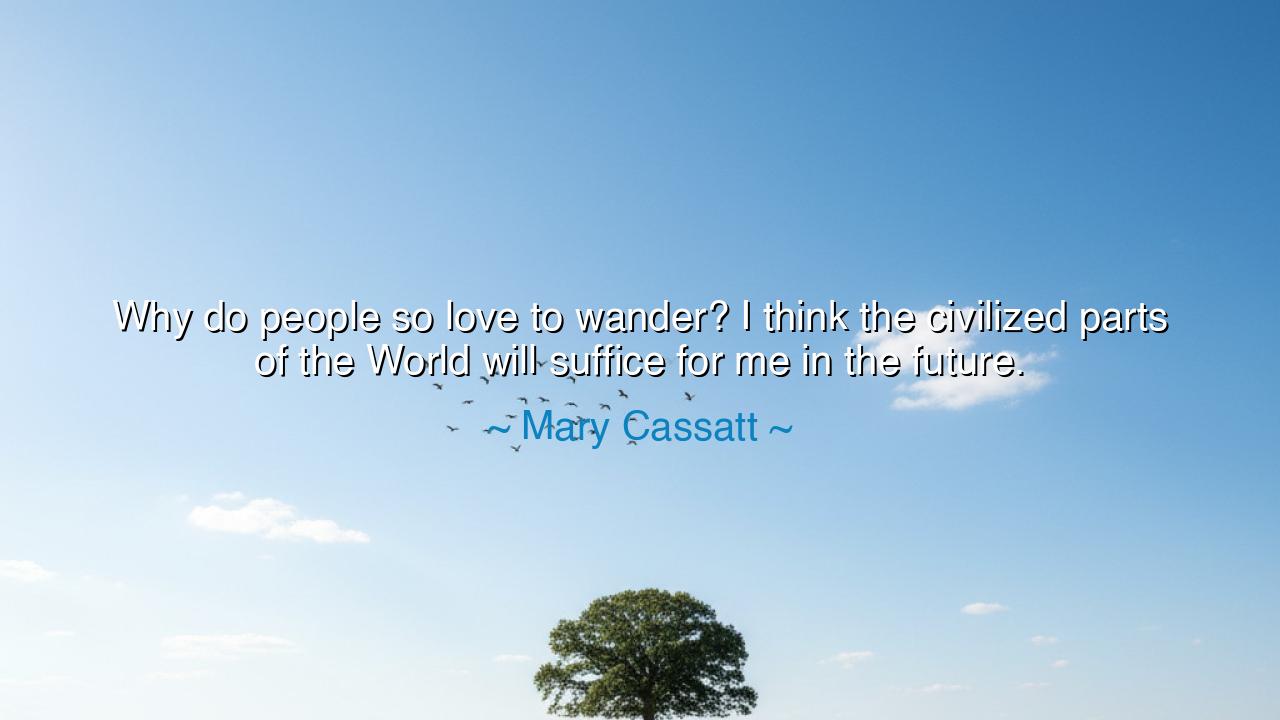
Why do people so love to wander? I think the civilized parts of
Why do people so love to wander? I think the civilized parts of the World will suffice for me in the future.






"Why do people so love to wander? I think the civilized parts of the World will suffice for me in the future." These words, spoken by the renowned Mary Cassatt, a brilliant artist known for her intimate depictions of women and children, reflect a profound meditation on the nature of wanderlust and the concept of home. Cassatt, through this quote, seems to ask why people are drawn to travel and seek what lies beyond the familiar. For her, the civilized parts of the world, those shaped by human culture, art, and society, are enough to satisfy her curiosity and her artistic soul. She suggests that the true riches of life are not found in wandering far and wide but in embracing the depth of the world as it is, in the places we know and live.
Throughout history, the act of wandering has held a deep and often sacred meaning. The ancients saw wandering as a metaphor for the search for wisdom, truth, or enlightenment. The Greek philosopher Diogenes wandered the streets of Athens, rejecting societal norms and searching for an authentic life, unconcerned with material wealth or fame. He famously lived in a barrel, content with the simple pleasures of existence. To him, wandering was a rejection of the superficial and a pursuit of deeper understanding. Similarly, the Roman poet Virgil depicted wandering as a central theme in his epic, The Aeneid, where the hero Aeneas embarks on a journey to find a new home, symbolizing the struggles and sacrifices required to build a civilization. Cassatt, however, seems to challenge this notion, finding contentment not in the endless quest for far-off lands but in the cultivated beauty of the civilized world she knew.
Consider the story of Alexander the Great, whose conquests spanned vast territories, from Greece to India, leaving a trail of cultural exchange and blending of worlds. Alexander’s wandering was not just a search for new lands but an attempt to shape the future of civilizations. Yet, his journey, though filled with glory, left a sense of restlessness in its wake. Despite his empire’s expansion, he could never find peace, forever driven by the need to conquer, to explore. The empire he built was vast, but it was also fragmented, lacking the sense of home and stability that Cassatt speaks of. Perhaps this is why Cassatt finds such satisfaction in the civilized world—in the order and structure that human culture has created, rather than the chaos of endless wandering.
Cassatt’s perspective speaks to the contentment found in embracing what is already known. In a world where travel and discovery are often seen as the highest forms of fulfillment, Cassatt suggests that there is profound wisdom in staying grounded, in finding joy and meaning within the world that has already been shaped by civilization. Embracing the present, in all its cultural richness, can be just as fulfilling as the relentless pursuit of something new. The civilized world, for Cassatt, offers all the nourishment she needs for her work and her spirit. It is a world where she can find beauty in the familiar, allowing her to create art that captures the subtleties of human life.
In our own lives, we often find ourselves chasing after the next big adventure or the next great experience, believing that fulfillment lies just beyond the horizon. But Cassatt’s quote serves as a reminder that the treasures we seek are often already within reach. We do not need to travel far to find meaning and richness in life. The civilized world, with all its complexity and beauty, holds ample opportunities for us to grow, connect, and create. Instead of always looking outward, we must learn to look inward, to recognize the depths of meaning in the world that surrounds us. Whether through relationships, creative endeavors, or simple acts of kindness, we can find endless fulfillment in the world we already inhabit.
The lesson here is that we do not need to wander aimlessly to find purpose or satisfaction. The quest for meaning is not always a journey to distant lands, but a journey into the heart of our own world. Find richness in the present, in the people, places, and experiences that are already before you. Like Cassatt, we can create and nourish our souls by cultivating the beauty of the familiar, rather than chasing after something that feels elusive. Embrace the world as it is, knowing that the answers to life’s great questions are often hidden in the ordinary, in the well-worn paths that we walk every day.
Let us be reminded that sometimes the greatest discoveries lie not in distant places, but in the way we choose to see the world we already inhabit. The civilized world, with its art, culture, and history, offers endless inspiration, and it is there that we must plant our feet firmly. Like Cassatt, we can find contentment in the richness of the world around us, celebrating what has already been created, and learning to appreciate the life we live right now. Let us not forget that the answers we seek may lie not in wandering far, but in living deeply within the world we have already been given.






AAdministratorAdministrator
Welcome, honored guests. Please leave a comment, we will respond soon